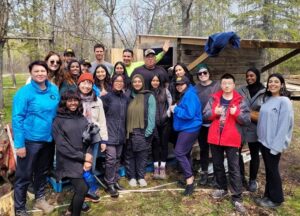Ocean Bridge program ambassadors visit Wiikwemkoong Unceded Territory

By Rick Garrick
WIIKWEMKOONG UNCEDED TERRITORY — A group of 16 Ocean Bridge program ambassadors and four staff from across the country recently visited Wiikwemkoong from May 5-12 to learn about Indigenous perspectives on ocean and freshwater protection. Ocean Bridge partnered with Wikwemikong Tourism, Wikwemikong Heritage Organization, and Wikwemikong’s Lands and Natural Resources department on the visit.
“We specifically spent time with the Species at Risk [Program] and we also engaged the (Wiikwemkoong) Pontiac School,” says Jacqueline Thompson, Ocean Bridge Great Lakes manager at Ocean Wise. “Some of the key highlights were the time we spent at the Wiikwemkoong marsh restoration project, the group learned about 26 species at risk and endangered in Wiikwemkoong territory, and they also were guided to traditional manomin (wild rice) harvesting areas. They also attended Buzwah Fisheries to learn about sustainable fishing practices and the effects of climate change.”
Thompson says the Ocean Bridge ambassadors also facilitated an Ocean Fun Festival at the Wiikwemkoong Pontiac School.
“All of our ambassadors facilitated 13 different games and art stations for the students to discuss the importance of water protection and what water means to them, but also to have some fun hands-on games and social engagement,” Thompson says. “The kids were introduced to different hand games that I learned here in Treaty 4 territory and my colleague also brought some hand games from the Coast Salish and from Australia. It was a really fun relaxed morning to see the youth learn new games, to meet new people, to understand that ocean and water protection is not all about textbooks and tests, it’s also about understanding the land and understanding one another.”
Thompson says it is important that the ambassadors are immersed in the cultural and traditional teachings of First Nations who are the traditional land and water protectors.
“It’s important for them to learn in these remote learning environments to really understand the impact from our waterways to the ocean and how that impacts every level of community, whether that impacts the health of the environment itself or it impacts the community’s access to clean safe water and whether that impacts community health,” Thompson says. “So they learn from nations, they learn from the grandmothers, the uncles, the aunties, the children about the importance of water protection from the people that are almost always unheard in mainstream or Western education.”
Aqila Walji, an Ocean Bridge ambassador from Calgary who works in community and social services, says it was an amazing experience to visit the Great Lakes for a week.
“To be there in Wiikwemkoong on Unceded territory and learning directly from Anishinabek people and Elders was amazing,” Walji says. “There’s so much about water that I didn’t know, there’s so much spiritual and cultural significance and we had the privilege of taking part in that and taking part in ceremonies.”
Walji says they travelled by boat to see where the manomin grows as well as the Killarney area and the North Channel.
“It was cool but it was also a little scary because it’s like endless lake wherever you see and I’m totally not used to that,” Walji says.
Walji says she had not had much exposure to Anishinabek culture before the visit to Wiikwemkoong.
“So that was really interesting to see the differences between their culture and Blackfoot culture, which is something I’ve spent a lot of time around,” Walji says. “And I’ve never been on Unceded land and that’s quite different from treaty land.”
Walji says they also went on a tour with the Lands and Natural Resources department during the visit.
“The individuals there showed us how they were tree planting and how they were trying to increase the population of the turtles,” Walji says. “They have almost 30 species that they are working to protect.”

